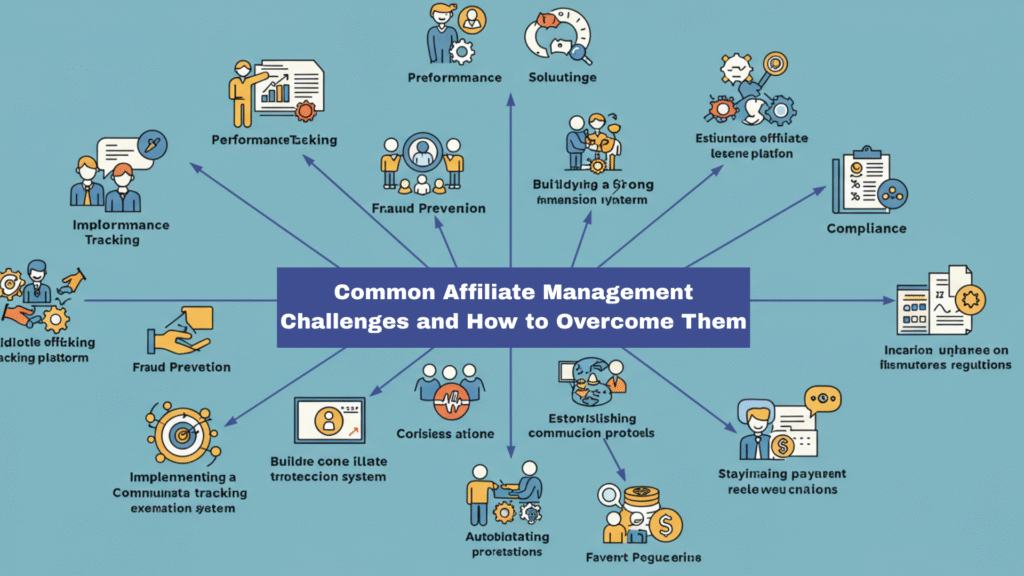
Introduction to Affiliate Marketing Management
The affiliate marketing manager operates as a key component in digital marketing success, while affiliate marketing emerges as one of the top-performing channels. Through affiliate marketing, businesses work with external promoters called affiliates who advertise their products or services. Companies establish affiliate partnerships with major publishers by working alongside bloggers, influencers, YouTubers, and comparison websites. Affiliates receive commissions when they direct traffic towards a merchant’s website, which results in sales.
The management of affiliate programs becomes increasingly complex as they expand to incorporate dozens or hundreds of partner relationships. Companies need to make certain that affiliate partners deliver consistent brand messaging while adhering to compliance rules and effectively selling products. Affiliate marketing management fills this role.
Businesses need to create and oversee affiliate programs to make sure affiliates achieve their performance goals while remaining in line with company objectives. The entire process includes the recruitment of affiliates through their full integration with the company structure by tracking performance and handling payments to build lasting partnerships. The role of an affiliate marketing manager includes establishing partnerships with affiliates and developing promotional strategies based on performance data analysis.
What Is an Affiliate Marketing Manager?
Any successful affiliate program relies heavily on the core contributions of an affiliate marketing manager. An affiliate marketing manager performs tasks beyond just monitoring links and tracking sales. Strategic professionals who manage partnerships between the brand and affiliate partners to maintain steady growth and preserve brand consistency.

They fulfill dual roles by serving as sales strategists and relationship managers who educate affiliates about the product to ensure genuine promotion and incentivize their performance. Within bigger organizations, they assume leadership roles over coordinators and analyst teams and create promotional plans while working alongside marketing, legal, and finance departments.
Key Responsibilities of an Affiliate Marketing Manager
Affiliate marketing managers fulfill responsibilities that include:
- Affiliate marketing managers recruit new affiliates through the identification of relevant influencers and bloggers along with their communities.
- Affiliate Marketing Managers train newly recruited affiliates to ensure they gain a full understanding of both the brand and the product they will promote.
- Affiliate marketing managers utilize Refersion, Impact, and CJ Affiliate as tools to monitor affiliate performance.
- Strong affiliate relationships require consistent communication alongside incentive programs.
- Affiliate managers must verify adherence to brand standards by monitoring correct logo usage and enforcing legal disclosures.
- Data analysis enables businesses to identify trends while forecasting growth and delivering performance reports to stakeholders.
- Affiliate campaign coordination requires working with multiple departments to support overall marketing objectives.
Case Study: A wellness industry e-commerce brand with mid-level size employed a full-time affiliate manager in 2023. Affiliate-driven revenue experienced a 35% increase during the six months. The affiliate manager’s structured onboarding program and quarterly performance bonuses, combined with monthly training webinars, have led to this growth. Affiliates experienced increased engagement because the direction was clear, and they received consistent support alongside timely payouts.
What Is Affiliate Management? A Deep Dive into Strategy and Success
The ongoing process of directing and optimizing an affiliate marketing program defines affiliate management. Managing an affiliate program requires both technical administration and strategic oversight to ensure profitable and ethical scaling.

Components of Successful Affiliate Management
Key elements of strong affiliate management include:
- Strategic Planning: Determine affiliate performance targets over various timeframes and establish commission plans while distributing funds appropriately.
- Consistent Communication: Keep affiliates updated about program changes while promoting new products and sales events.
- Platform Utilization: Utilize affiliate tracking platforms and dashboards to track sales performance and measure clicks and ROI.
- Motivational Campaigns: Introduce seasonal promotions together with bonus programs and leaderboards to enhance affiliate performance.
- Compliance Enforcement: Affiliates should follow FTC guidelines along with brand rules and ethical standards.
Table: Tools Commonly Used in Affiliate Management
| Tool | Purpose |
| Refersion | Affiliate tracking and reporting |
| Tapfiliate | Campaign management |
| Impact | Partner discovery and analytics |
| Google Analytics | Performance insights |
Statistical Insight: Statista projects that global affiliate marketing spending will hit $13 billion by 2024. The rise to 50% growth over five years demonstrates greater industry trust in performance-based partnerships. Brands utilizing affiliate managers observe ROI growth rates of up to 40% better than those without such managers.
How to Manage Affiliates Like a Pro
Professional affiliate management requires you to empower your partners through appropriate tools and support systems instead of micromanaging their actions. This plan will guide you through creating a top-tier affiliate team.

Set the Bar High with Clear Goals
Establish precise performance metrics, including conversions and traffic volume, alongside average order value, and communicate these KPIs with your affiliates to ensure they understand what successful performance entails.
Equip Your Affiliates with Powerful Marketing Assets
Don’t leave your affiliates guessing. Provide them with:
- Polished, brand-approved marketing materials
- Ready-to-use banners and creatives
- Email templates tailored to customer personas
- Social media assets and sample posts
Track Performance Like a Data-Driven Coach
Use Refersion, Impact, or Tapfiliate platforms to track the performance of your affiliates instantly. Focus on:
- Top-performing affiliates
- Underperformers who need guidance
- Conversion and click-through trends
Give Feedback That Fuels Growth
Share feedback with your affiliates regularly:
- Highlight strengths
- Suggest improvements
- Offer encouragement and performance incentives
Optimize Campaigns Continuously
Maximize conversion rates by A/B testing marketing materials while personalizing offers and improving messaging to maintain top affiliate performance.
Tips for Building Strong Affiliate Relationships

Strong affiliate relationships create long-term loyalty. Here’s how to build them:
- Maintain open lines of communication with affiliates through email, Slack messaging, and dedicated affiliate portals.
- Respond to affiliate inquiries promptly and share resources without delay
- Give affiliates early access to new products and special deals.
- Celebrate milestones and publicly recognize top affiliates
- Monthly newsletters should be sent to maintain their knowledge and active participation
Example: Brands witnessed a 25% boost in affiliate participation by establishing private Facebook groups that offered real-time Q&A sessions along with peer learning opportunities and bonus updates.
Top Traits of Effective Affiliate Managers
To succeed as affiliate managers requires professionals who combine interpersonal abilities with analytical thinking and technical expertise.

Traits include:
- Excellent Communication: Successful affiliate managers teach affiliates about the brand’s goals as they inspire them to work toward achieving those goals and confirm their actions support the brand’s objectives.
- Analytical Thinking: To track performance and optimize strategies
- Organizational Abilities: For managing deadlines, campaigns, and outreach effectively
- Technical Proficiency: Affiliate managers demonstrate technical proficiency through their use of affiliate platforms alongside CRM systems and analytics tools.
- Negotiation Skills: The role requires negotiation skills to establish custom commission structures and exclusive partnerships.
- Empathy and Flexibility: Affiliate challenges require comprehension so that strategies can be modified to suit those needs
Common Affiliate Management Challenges and How to Overcome Them
Affiliate management provides rewards, yet encounters challenges that may affect your program’s success.

Common challenges include:
- Low engagement from affiliates
- Tracking discrepancies and data mismatches
- Poor communication leads to missed opportunities
- Risk of affiliate fraud
- Payment delays impacting trust
Solutions:
- Update affiliates through newsletters and use real-time chat to maintain motivation.
- Register reliable tracking software and perform audits regularly
- Create communication protocols and escalation plans
- Vet affiliates carefully and monitor traffic sources
- Automate payouts and prioritize on-time payments
Final Thoughts: Becoming proficient in the Affiliate Marketing Manager position
The management of affiliate marketing functions as a strategic role that goes beyond basic operations to significantly impact brand success. The program reaches new heights when an affiliate marketing manager successfully builds a network of dedicated partners who deliver consistent value.

Tips to thrive in this role:
- Keep current with FTC compliance requirements and monitor the latest affiliate marketing trends.
- Foster affiliate relationships by maintaining transparency and regularly connecting with partners
- Performance data analysis should guide ongoing enhancements to the program.
- Test different commission structures and reward consistency
- Develop a compilation of case studies and testimonials that will serve as inspiration for affiliates.
Affiliate marketing managers function as strategic growth leaders who integrate relationship building with revenue generation.
Frequently Asked Questions About Affiliate Marketing Management
Q1: What is an affiliate marketing manager?
Affiliate marketing managers direct affiliate programs by boosting performance through recruitment and relationship building and by monitoring performance metrics.
Q2: Should my business use a specific manager to oversee its affiliate program operations?
You require a specialized affiliate manager when your goal is to expand your affiliate program substantially. A dedicated manager delivers organizational structure while maintaining focus to develop sustainable growth strategies.
Q3: What does affiliate management involve?
Affiliate management encompasses recruiting partners while setting objectives through performance support and tracking, combined with monitoring traffic quality and campaign optimization.
Q4: How can I effectively manage affiliates?
To maintain affiliate engagement, utilize management tools while delivering regular communication and creative resources alongside motivating incentives.
Q5: Is affiliate management possible without relying on affiliate management software?
Technically, yes. Management tools improve operations by cutting human errors while offering scalable control as programs grow.
Q6: How much do affiliate marketing managers earn on average?
The salary for affiliate marketing managers ranges from $50,000 to $100,000 and varies according to their industry sector and professional experience while company size affects their salary range. Affiliate marketing managers who work for big technology companies make more than $120,000 annually.
Q7: What resources do affiliate managers use to reach successful outcomes?
Affiliate managers generally operate through affiliate tracking platforms such as Refersion and Impact while utilizing email marketing tools like Mailchimp and ConvertKit, managing customer relationships through CRMs such as HubSpot and Salesforce, and analyzing data with dashboards like Google Analytics and Tableau.

